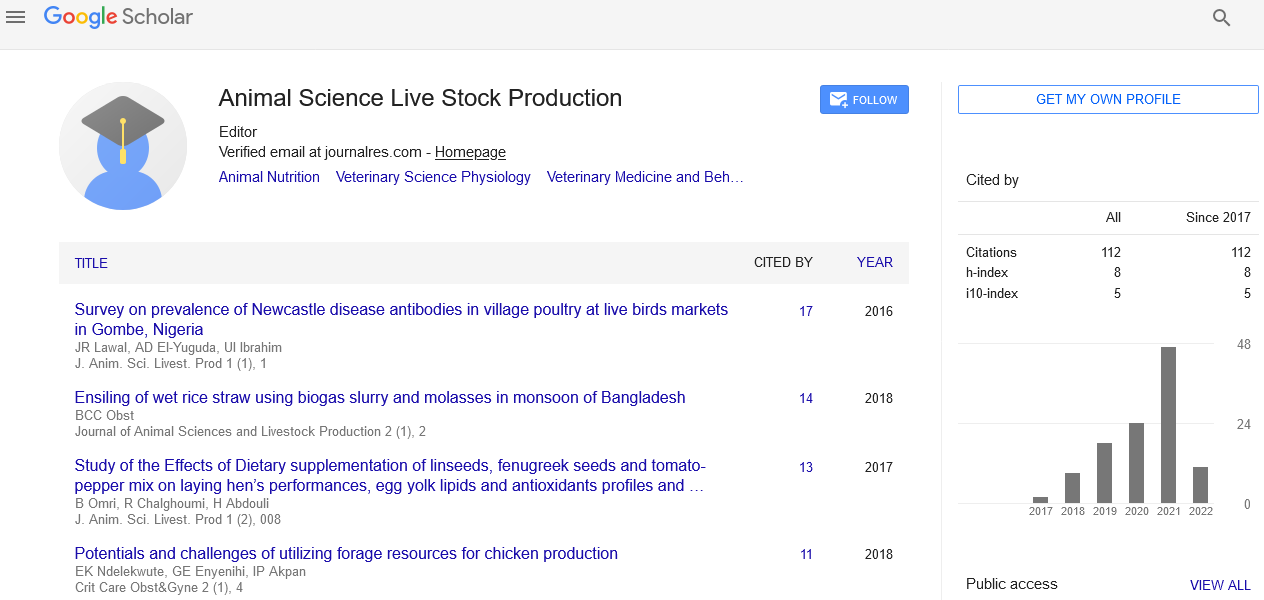Perspective - (2024) Volume 8, Issue 1
Integral Role of Animals in Livestock Production: cornerstone of agriculture
James Adam*
Department of Animal Sciences, Michigan University, USA
*Correspondence:
James Adam,
Department of Animal Sciences, Michigan University,
USA,
Email:
Received: 28-Feb-2024, Manuscript No. IPJASLP-24-19311;
Editor assigned: 01-Mar-2024, Pre QC No. IPJASLP-24-19311 (PQ);
Reviewed: 15-Mar-2024, QC No. IPJASLP-24-19311;
Revised: 20-Mar-2024, Manuscript No. IPJASLP-24-19311 (R);
Published:
27-Mar-2024, DOI: 10.36648/2577-0594.8.1.07
Introduction
Livestock production is a cornerstone of agriculture, providing
essential resources such as meat, milk, eggs, and wool to
sustain human populations worldwide. At the heart of this industry
lies the crucial role played by animals. From cows and
chickens to sheep and pigs, these creatures are not merely
commodities but integral partners in the intricate ecosystem of
agriculture. Animals are primary contributors to the global food
supply, providing rich sources of protein, essential vitamins,
and minerals necessary for human nutrition. Livestock such as
cattle, poultry, and fish are bred and raised specifically to fulfill
this fundamental dietary requirement. Meat, dairy, and eggs
derived from these animals constitute significant components
of human diets, offering essential nutrients that contribute to
growth, development, and overall health. Livestock production
serves as a significant economic driver in many regions,
providing livelihoods for millions of people worldwide. Beyond
the direct sale of animal products, this industry supports ancillary
sectors such as feed production, veterinary services,
transportation, and processing facilities, creating employment
opportunities and stimulating economic growth. Moreover,
livestock farming often serves as a source of income diversification
for rural communities, contributing to poverty reduction
and socio-economic development. Animals possess a remarkable
ability to convert non-edible resources such as pasture,
crop residues, and by-products into valuable sources of food
and other products. For instance, ruminant animals like cattle
efficiently utilize fibrous plant materials through microbial
fermentation in their digestive systems, converting them into
high-quality protein in the form of meat and milk. This capacity
to transform low-quality feedstuffs into nutrient-rich products
enhances the sustainability of livestock production systems
and minimizes competition with human food resources.
Description
Livestock play a vital role in ecological balance and environmental
management. Grazing animals contribute to landscape
maintenance by preventing the overgrowth of vegetation and
reducing the risk of wildfires in pasturelands. Furthermore,
their manure serves as a valuable organic fertilizer, replenishing
soil nutrients and enhancing soil fertility. Sustainable livestock
farming practices, such as rotational grazing and agroforestry,
can also mitigate environmental degradation, promote biodiversity
conservation, and contribute to carbon sequestration
efforts. Animals hold profound cultural and social significance
in many societies, symbolizing heritage, tradition, and identity.
Livestock rearing practices are deeply ingrained in cultural rituals,
ceremonies, and festivities, fostering a sense of community
cohesion and belonging. Additionally, livestock ownership
often serves as a measure of wealth and social status in rural
communities, influencing social dynamics and interpersonal relationships.
Animals serve as invaluable subjects for scientific
research and innovation in various fields, including animal husbandry,
genetics, nutrition, and veterinary medicine. Through
selective breeding programs and genetic manipulation, researchers
strive to enhance desirable traits such as productivity,
disease resistance, and environmental adaptability in livestock
species. Furthermore, advancements in animal welfare
science and technology contribute to the development of more
ethical and sustainable farming practices, ensuring the well-being
of animals throughout their lives.
Conclusion
In conclusion, animals are indispensable partners in livestock
production, contributing to human nutrition, economic prosperity,
environmental stewardship, cultural heritage, and scientific
advancement. As global demand for animal products
continues to rise, it is imperative to recognize and appreciate
the multifaceted role of animals in sustaining the vitality and
resilience of livestock production systems. By adopting holistic
and sustainable approaches to animal management and welfare,
we can ensure the long-term viability and prosperity of
this essential industry.
Citation: Adam J (2024) Integral Role of Animals in Livestock Production: Cornerstone of Agriculture. J Animal Sci. 8:07.
Copyright: © 2024 Adam J. This is an open-access article distributed under the terms of the Creative Commons Attribution License, which permits unrestricted use, distribution, and reproduction in any medium, provided the original author and source are credited.

